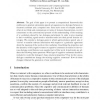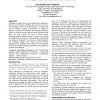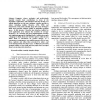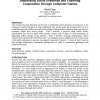145 search results - page 6 / 29 » How do users think about ubiquitous computing |
AGENTCL
2003
Springer
14 years 3 months ago
2003
Springer
The goal of this paper is to present a computational framework that enables us to generate elementary speech act sequences in a dialogue between an electronic assistant and a compu...
CHI
2003
ACM
14 years 10 months ago
2003
ACM
This paper considers how we may realize future ubiquitous domestic environments. Building upon previous work on how buildings evolve by Stewart Brand, we suggest the need to broad...
MOBIQUITOUS
2005
IEEE
14 years 3 months ago
2005
IEEE
Ubiquitous Computing Environments feature massively distributed systems containing a large number of devices, services and applications that help end-users perform various kinds o...
LAWEB
2009
IEEE
14 years 4 months ago
2009
IEEE
—Computer science academics and professionals typically consider their contributions in terms of the algorithms, applications, and techniques that they develop. Yet equally impor...
DIGRA
2005
Springer
14 years 3 months ago
2005
Springer
The concept of social dilemmas can be used to understand social situations all around us. I am looking at identity formation to help understand why people make the decisions they ...




